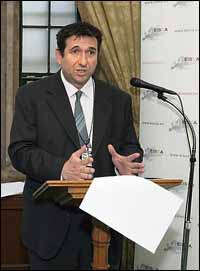|
PROFILE Author victim of very antisemitism that he is trying to eradicate | |
But because of his work in the field he has become the victim of the very antisemitism to which he is devoting his life to eradicate. The Manchester-born academic, who began his working life as a psychiatric nurse, revealed that his Polish-born maternal grandparents lived in a Cheetham Hill street in which the inhabitants of one side were Jewish and the other Polish. His non-Jewish grandparents used to serve chicken soup and used Yiddish expressions like 'Oy vey'. In fact, when between 1999 and 2005, Dr Iganski was working for the Institute for Jewish Policy Research, the atmosphere there reminded him of his grandparents' home. Nevertheless, Dr Iganski, whose father had served in the Polish air force during World War II, was brought up a Catholic and attended Manchester's Catholic Xaverian College. But that did not prevent him from receiving antisemitic hate mail and verbal abuse on the publication of his reports and books on antisemitism. He recalled that after the publication of his groundbreaking 2003 book, A New Antisemitism?, he received an email from an Indonesian declaring that it was a pity that his family had not been wiped out in the Holocaust and threatened to send a suicide bomber after him. Stating that he does possess "stereotypical Jewish features", Dr Iganski has had 'Jew boy' shouted at him from vans - a few "minor" incidents, which have added to the CST's antisemitism statistics. But more subtle and just as difficult, he says, have been the assumption by some of his previous academic colleagues that everyone is as equally biased against Israel as themselves. Sociology lecturer Dr Iganski said: "The atmosphere in university common rooms is very anti-Israel. Many sociologists are left-leaning and support the underdog. "They all have good intentions. But it is inevitable that they take sides." He continued: "They seem to take it for granted that everyone thinks the same way. It is very hard being the dissenting voice." Having visited Israel with the Academic Friends of Israel through whom he met all sides of the political spectrum from Palestinians in Ramallah and Israeli peace activists to senior IDF officers, Dr Iganski said: "It is not a simple black and white picture. "I see the role of the scholar to introduce shades of grey and to muddy the water." Dr Iganski reckons that Britain currently exhibits two strands of antisemitism - intellectual antisemitism, which is fuelled by the Israel-Palestinian conflict, and street antisemitism, which is "not necessarily" triggered by politics. These street offenders, he said, "act out notions of bigotry which are intricately woven beneath the surface of British society". Dr Iganski did not find himself immune from these influences in his formative years. He said: "I have three university degrees yet I still find myself recalling some of the ideas I had from the age of 13-15, such as school friends' anti-Pakistani and anti-Irish jokes." He added: "Some of my school friends were then dallying with the National Front. I was so socialised that I can still think those thoughts." However, despite his admission of deep-rooted bigotry inculcated in his formative years, Dr Iganski has always had the courage to go against the prevailing trend of prejudice. He was brought up Paul Egan, although his father's family name had originally been Iganski. His father had changed it to Egan because xenophobic discrimination in Britain following World War II prevented him gaining employment in engineering. Dr Iganski said: "I deliberately changed my name back to Iganski to right an injustice." He only entered university at the age of 27 after working for nine years as a psychiatric nurse at Cheadle Royal Hospital. He said: "I wanted to extend myself. I was working with a multi-disciplinary team, which included psychiatrists, psychologists and occupational therapists and felt I could be as capable of study as they were." One university degree followed another. A BA in social science and administration at London University was followed by an MA at Manchester University in applied social research and then by a PhD in social policy at the London School of Economics. Dr Iganski's academic interest in antisemitism began in 1998 when he took a sabbatical from his academic career of university lecturing in Plymouth and Sussex in order to go for a year to Boston's Northeastern University. He had chosen to spend his sabbatical at the university's Centre on Violence and Conflict after meeting its director, Professor Jack Levin, at a conference. Prof Levin, a leading American hate crime scholar, became a major influence on Dr Iganski's thinking. The following year he joined the Institute for Jewish Policy Research, becoming a Civil Society Fellow from 1999-2005. During that time he co-edited the book A New Antisemitism and co-authored Hate Crimes Against London Jews. He described the JPR at that time - when it was under the leadership of Barry Kosmin - as "a very stimulating environment, an intellectual hothouse". Since moving two years ago to Lancaster University where he is senior lecturer in social justice, he has continued working on antisemitism, publishing Hate Crime and the City last year and co-writing the European Institute for the Study of Contemporary Antisemitism's report Understanding and Addressing the Nazi Card last summer. He is currently working on a book on anti-Jewish hate crime. Despite the antisemitic attacks which have come his way, Dr Iganski does not regret having taken a stand. But he is saddened by politically-motivated personal attacks against his work by the very Jews he is trying to support. Dr Iganski's summer report came under heavy fire from a Jewish critic on the Guardian website. But he said: "I am a naïve optimist. I still believe in the Fabian tradition of research-based evidence being the guide to policy. I have been hurt by highly polarised infighting within British Jewry. "I would have expected more engagement than polarisation."
|
